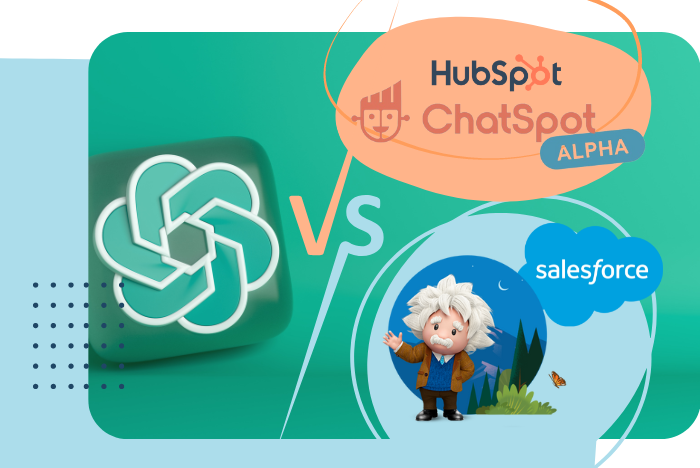What are chatbots?
Before we dive into the comparison, let's first define what chatbots are. Chatbots are software applications that simulate human conversations. They can be used to automate tasks, answer customer inquiries, and even provide personalized recommendations. Chatbots are becoming increasingly popular because they allow businesses to save time and resources, while still providing excellent customer service.
The Contenders
Salesforce's Einstein GPT
Salesforce's Einstein GPT (Generative Pre-trained Transformer) is a chatbot powered by artificial intelligence (AI) and natural language processing (NLP). It uses machine learning algorithms to understand the intent behind customer queries and provide personalized responses in real-time. The chatbot can be integrated with Salesforce's CRM and other applications, making it a powerful tool for sales and marketing teams.
One of the advantages of Einstein GPT is that it can be integrated with other Salesforce products, such as Sales Cloud and Service Cloud. This means that if a customer's inquiry requires assistance from a sales or service representative, the chatbot can easily transfer the customer to the appropriate department.
Key Features of Salesforce's Einstein GPT
- AI-powered chatbot with NLP capabilities
- Personalized responses based on customer queries and context
- Integration with Salesforce CRM and other applications
- Real-time communication with customers
- Ability to handle multiple languages
- Customizable chatbot design and branding
Hubspot's Chatspot
Hubspot's Chatspot is another popular chatbot that helps businesses automate their customer support and sales processes. Like Einstein GPT, it uses NLP to understand the intent behind customer queries and provide relevant responses. The chatbot can also be integrated with Hubspot's CRM and other applications, making it a powerful tool for businesses of all sizes.
Chatspot can be used to automate tasks such as booking meetings and collecting customer information. It also has a feature called "conversational intelligence", which allows businesses to analyze customer conversations and gain insights into their behavior and preferences.
Key Features of Hubspot's Chatspot
- AI-powered chatbot with NLP capabilities
- Integration with Hubspot CRM and other applications
- Customizable chatbot design and branding
- Real-time communication with customers
- Ability to handle multiple languages
- Automated scheduling and appointment booking
Comparison
Now that we have a basic understanding of both chatbot solutions, let's compare them. Here are the main factors to consider:
- Integration: Both Einstein GPT and Chatspot can be integrated with their respective CRM platforms. However, Einstein GPT can only be integrated with Salesforce products, while Chatspot can be integrated with Hubspot's wider range of products.
- Personalization: Each chatbot uses AI to provide personalized recommendations to customers. However, Einstein GPT has the advantage of being able to use the customer's purchase history to make recommendations.
- Automation: Both chatbots can be used to automate tasks. However, Chatspot has the advantage of being able to automate tasks such as booking meetings and collecting customer information.
- Analytics: Both allow businesses to analyze customer conversations. However, Chatspot has the advantage of having a specific "conversational intelligence" feature.
Although both systems' core functionality act alike, there are many considerations to take when deciding which is best for your business. Let's take a deeper dive into the comparison factors between Salesforce's Einstein GPT and Hubspot's Chatspot.
First, let's talk about natural language processing (NLP) capabilities. Both tools utilize NLP to understand and analyze user input, but there are some key differences in how they approach it. Salesforce's Einstein GPT uses cutting-edge AI and machine learning algorithms to analyze language and generate responses that mimic human conversation. It can even understand the nuances of natural language, like sarcasm and colloquialisms. On the other hand, Hubspot's Chatspot uses a more rule-based approach to NLP, which means it may struggle to understand complex or nuanced language. Overall, when it comes to NLP capabilities, Salesforce's Einstein GPT has a clear advantage.
Another important factor to consider is integration with other tools and platforms. Salesforce's Einstein GPT is part of the larger Salesforce ecosystem, which includes a variety of other business tools like customer relationship management (CRM) software and marketing automation. This integration makes it easy for businesses to use Einstein GPT alongside other tools they may already be using. In contrast, Hubspot's Chatspot is part of the Hubspot platform, which includes a range of marketing and sales tools. While Chatspot may be better integrated with these other Hubspot tools, it may be more difficult to integrate with other third-party tools. Ultimately, which tool is better for integration will depend on the specific needs of each business.
Finally, pricing. Salesforce's Einstein GPT is a premium tool, and its pricing reflects that. It is typically more expensive than Hubspot's Chatspot, which offers a more affordable pricing structure. However, businesses that are willing to pay for the advanced features and capabilities of Einstein GPT may find that the investment is worth it in the long run. On the other hand, businesses that are just starting out or have a limited budget may find that Hubspot's Chatspot is a more accessible option.
Conclusion
So, who wins the battle between Salesforce's Einstein GPT and Hubspot's Chatspot? The answer is not straightforward, as both chatbots have their own unique advantages. However, if we had to choose one, we would choose Hubspot's Chatspot.
The reason for this is that Chatspot can be integrated with a wider range of products, and has more automation features. Additionally, its "conversational intelligence" feature allows businesses to gain valuable insights into their customers' behavior and preferences.
However, it is important to note that both chatbots are excellent solutions for businesses looking to save time and resources while still providing excellent customer service. Ultimately, the choice between the two will depend on the specific needs of the business.




